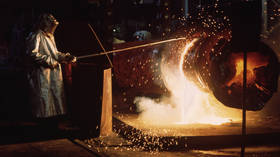
The dynamic has been blamed on the break in the EU’s economic ties with Russia

© Getty Images / Ezra Bailey
The business climate index in the euro area fell to its lowest level in two years in May, according to a preliminary estimate by the EU’s statistics agency, Eurostat, released on Tuesday.
Data showed that the indicator, which is based on monthly surveys and is designed to assess the state of the business environment within the euro area, dropped from 0.5 points in April to 0.19 points in May. It is currently at its lowest level since early 2021, when the region’s economy was suffering the effects of the Covid-19 pandemic.
According to Eurostat, the situation is most severe in the region’s industry sector, where the level of business activity has fallen for 11 months in a row. The euro area industrial sentiment indicator in May remained in the negative zone for the third straight month, having renewed its two-year minimum by dropping from April’s -2.8 points to -5.2 points. Sentiment also deteriorated in the service, retail and construction sectors.
Experts believe that one of the main reasons for the dynamic is the break in the EU’s economic ties with Russia. The bans imposed as part of Ukraine-related sanctions on supplies of equipment and machinery to Russia has harmed EU manufacturers, while the severance of Russian energy imports has led to a spike in inflation in the region. Sanctions on Russian energy have forced local authorities to hike interest rates for the first time in years to combat rising prices, which has made life even more difficult for local businesses, analysts say.
“More than half of Russia’s imports from the EU were machine tools and industrial equipment. Against the background of the imposed restrictions, many exporters were forced to stop supplying their products to Russian customers. Therefore, the decline in the European capital goods industry is a direct consequence of the sanctions against Moscow,” Natalia Milchakova, lead analyst at Freedom Finance Global, said in a comment to RT.

There have been disagreements among EU countries regarding potential new sanctions against Russia due to their effect on the region’s economy. Brussels, however, has continued to work on the next package of restrictions, which could reportedly include a halt to the remaining Russian oil flows to EU countries.
“The bottom line is that the actions of some EU states are starting to hit the economy of others. Add to this Germany and Italy, whose industry was very dependent on cheap Russian gas, the ban on grain exports from Ukraine to a number of EU countries, and a record increase in interest rates. So we are seeing a deterioration of the business climate, because under such circumstances any development and growth is out of the question. Business is now more concerned with survival,” Artem Deyev, head of the analytical department at AMarkets, told RT.
For more stories on economy & finance visit RT’s business section




